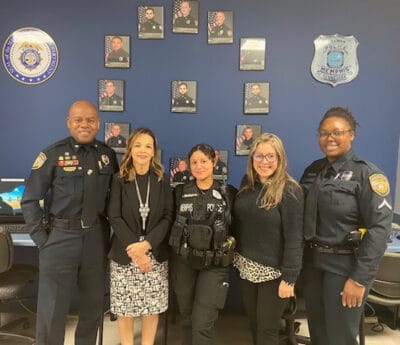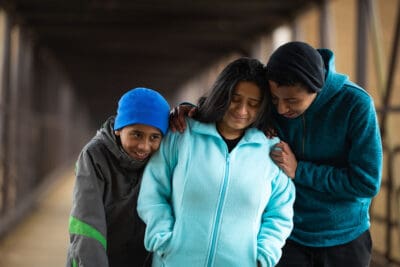CasaLuz had the great opportunity to receive a site visit from Silvia Torres, Victim Justice Program Specialist from the Enhancing Access to Victim Services grant from the Department of Justice, Office for Victims of Crime (OVC). Also, Sandra Harrell and Aquia Pusch from Activating Change, a Technical Assistance partner agency under this grant, participated as well. Aquia and Sandra have been offering ongoing guidance, support, access to resources, and they have shown their commitment as strong allies in helping us to expand our impact in the community. We don’t take for granted this type of partnership that truly understands the implications of the work we do because it has not been easy for us to find partners like them.
In the realm of aiding victims of crime and offering culturally and linguistically-specific services to underserved victims such as CasaLuz clients, it’s vital to understand the extra efforts we take to serve our clients. Culturally-specific organizations play a pivotal role in providing services and guidance in a safe and welcoming space where language and cultural understanding are no barriers to receiving the vital services victims of crime need. Also, it’s important to note that we have more limited access to resources, especially unrestricted funding due to biases and discrimination aimed at us because of the population we serve. Amidst this landscape, federal grants serve as crucial lifelines, offering financial assistance to bolster our organizations’ efforts.
Furthermore, being the only culturally-specific organization in the area means we carry a heavy load while assisting adult Hispanic/Latinx victims of domestic violence, sexual assault, stalking, and other violent crimes, and children and adolescents exposed to domestic violence in the Memphis/Shelby County area. While we do serve men and members of the LGBTQ+ community, nearly 90% of our clients are Spanish-speaking immigrant women with an average of 4 children (the majority have been born in the USA) with limited English proficiency (LEP), and a low/extremely low household income based on the poverty levels as defined by the U.S. Department of Health and Human Services.
Site visits are a crucial step in assessing the organization’s capacity to effectively utilize grant funds and achieve desired outcomes, and for grantors to have a deeper understanding of the many ongoing challenges, biases, discriminations, and barriers many organizations like CasaLuz face daily. This site visit underscored the importance of federal grants, especially cultural-specific grants that are designed to address the pressing needs of underserved communities, which aligns perfectly with CasaLuz’s mission and vision. These types of grants focus on emphasizing positive change and highlight the significance of supportive interactions between grantors and grantees on behalf of the population we serve.
This site visit served as a platform for meaningful engagement and collaboration. Instead of a mere compliance check, it evolved into a constructive dialogue aimed at understanding CasaLuz’s strengths, challenges, and aspirations. Silvia Torres took a holistic approach, immersing herself in the organization’s day-to-day operations and engaging with staff. This hands-on approach fostered a sense of camaraderie and mutual respect, transcending the typical grantor-grantee dynamic.
A deep and sincere “Muchas Gracias” (Thank You Very Much) to Silvia Torres for providing us with invaluable feedback, insights, and guidance, as this visit showed support for CasaLuz’s growth and resilience. With renewed confidence and determination, CasaLuz will continue working to tackle the multifaceted challenges of supporting Hispanic/Latinx victims of crime in the Memphis/Shelby County area.


